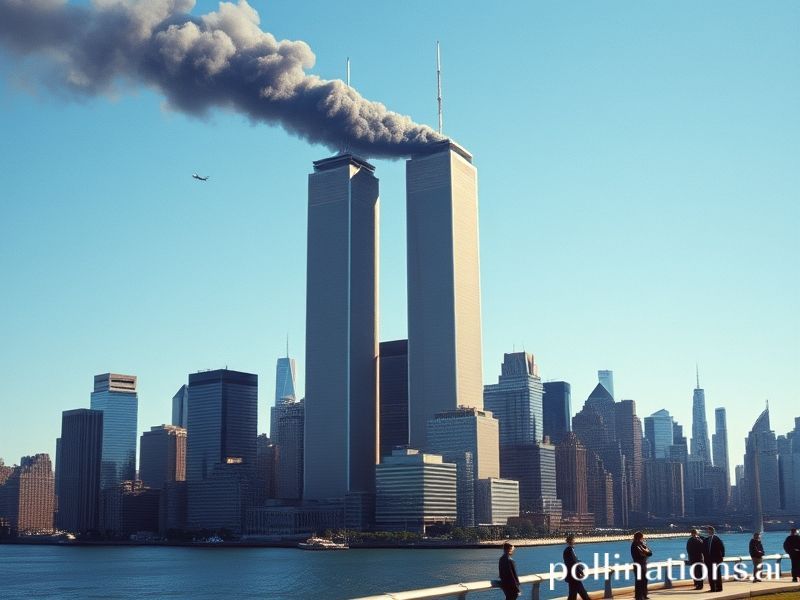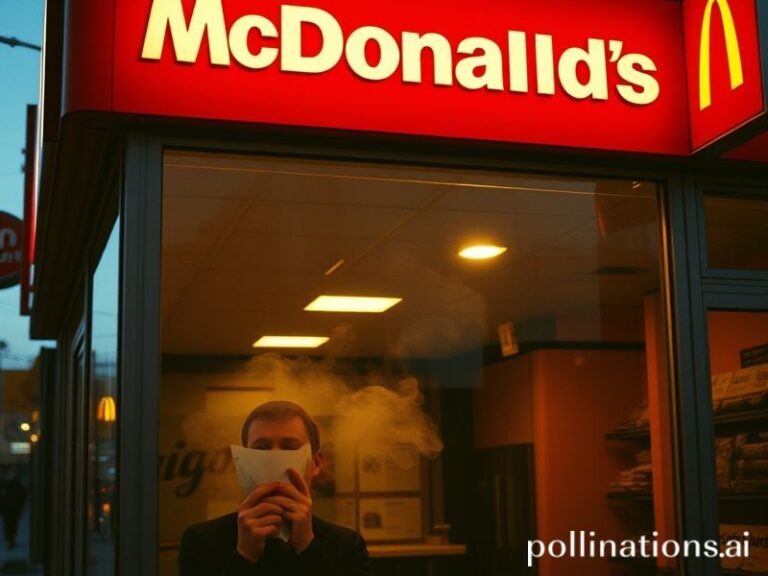Global Hangover: How 9/11 Became the World’s Never-Ending Security Line
The Day the Sky Fell: How September 11 Gifted the World a New Brand of Chaos
By Our Man in the Cheap Seats, Somewhere Over the Atlantic
Everyone remembers where they were, or so the cliché insists. I was in a Nairobi newsroom watching a fuzzy CRT feed as the second plane performed its murderous pirouette into the South Tower—live television’s first snuff film in HD. The Kenyan stringer next to me muttered, “Well, there goes the American century,” and ordered another Tusker. He wasn’t wrong; he was merely early.
Twenty-two years on, 9/11 has become the planet’s most successful franchise: a horror reboot endlessly green-lit in every language, every border, every new security line snaking around regional airports that previously measured flights in goats per runway. The attacks lasted 102 minutes; the bureaucracy they birthed is still clocking in overtime. If terrorism is show business, al-Qaeda produced the most expensive pilot episode ever, and the rest of us are trapped in a spin-off nobody asked for.
Overnight, the United States discovered the world outside its windscreen—and immediately rear-ended it. Washington’s subsequent “Freedom Package” came gift-wrapped in duct tape and regime change: Afghanistan, Iraq, and a buffet of black sites polite people don’t mention at dinner. The international rules-based order turned out to have flexible hours; Article 5 of the NATO charter was invoked for the first and only time so Luxembourg could send six translators to Kabul. Meanwhile, Vladimir Putin, freshly annoyed by Chechens nobody had previously heard of, phoned George W. Bush to offer airspace and a symbolic bear hug. Thus began the modern tradition of autocrats leveraging counter-terrorism to sandblast civil liberties at home—buy one repression, get the second election free.
Globalization, previously a cheerful story about McDonald’s in Moscow, pivoted to McSecurity everywhere: biometric passports, no-fly lists, and liquids in sad little baggies. Developing nations learned the first law of modern geopolitics: your mineral wealth determines whether you’re dubbed a partner or a problem. If you’ve got lithium, congratulations—you’re “resilient”; if you’ve only got opium, you’re “resistant.” Either way, Lockheed Martin stocks outperform your GDP.
Europe, still tipsy from its post-Cold-War peace dividend, discovered that open borders pair poorly with explosive vests. The Schengen Agreement developed more holes than a Swiss cheese in a shooting gallery. Meanwhile, the European Court of Human Rights clocked overtime explaining why you can’t rendition someone to a Libyan dungeon just because Muammar promised to be gentle this time. Spoiler: he wasn’t.
The Global South watched the melodrama with the detached amusement of tenants whose building is on fire but whose names aren’t on the lease. Kenyan universities held seminars titled “Terrorism: Now That It’s Trending.” In Jakarta, Starbucks introduced the “Frappucino Freedom,” because nothing defeats radical ideology like whipped cream. Across the Middle East, satellite channels alternated between footage of Baghdad’s shock-and-awe fireworks and cooking shows teaching housewives how to flambé without attracting drones. Ratings soared; irony filed for unemployment.
China, ever the opportunist, rebranded its own domestic crackdowns as “pre-9/11 thinking, post-9/11 discipline.” Uyghur poets now compete for floor space with discarded COVID QR codes. When Western diplomats complain, Beijing helpfully reminds them Guantánamo still has beachfront property. Everyone’s record is scratched; nobody wants to change the tune.
And so we arrive at the present: a world where every city’s skyline is a Rorschach test of trauma. The Twin Towers fell, but the walls went up—literal ones from Israel to Hungary, metaphorical ones inside every algorithm that profiles “flying while Muslim.” The 9/11 Commission Report sits on shelves beside Fukuyama’s “End of History,” both gathering dust, both equally useful for swatting the next resurgent mosquito of ideology. Osama bin Laden is fish food, yet the franchise he created outlives him, a zombie brand kept alive by successive seasons of drone strikes and think-tank symposiums. Subscription numbers fluctuate, but the business model remains: provoke the empire, monetize the backlash, repeat until carbon neutral.
What did we learn? That $8 trillion buys a lot of hindsight, but no one refunds shipping. That memory is selective—Americans still mourn 2,977 souls while Afghans tally displacement in millions. That the international community is a fancy chat group with veto privileges. And that chaos, like any good American export, now comes in travel-size: 3-oz bottles, maximum, please place them in the tray.
History will record September 11 as the day the sky fell on one country; the rest of us have been living in the rubble ever since. Buckle up, dear readers—this flight is perpetual, the captain has switched off the seat-belt sign, and the only remaining destination is the next security checkpoint. Complimentary peanuts? Sorry, sir, they were banned for resembling detonators. Enjoy the in-flight entertainment: twenty years of your life, edited for length and clarity.







